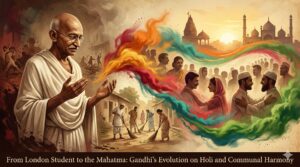George Orwell’s essay “Reflections on Gandhi” presents a critical analysis of Mahatma Gandhi’s life and principles. Orwell begins by questioning Gandhi’s saintly image, stating that saints should be judged guilty until proven innocent, particularly in the realm of politics where compromise is often necessary. He acknowledges Gandhi’s extraordinary moral courage and his unwavering dedication to principles of truth, non-violence, and simplicity, but also critiques the limitations of these ideals in the context of political struggles.
Orwell points out the British government’s perception of Gandhi as a useful figure who helped control violent uprisings, while Indian millionaires preferred him to socialists who threatened their wealth. Despite these mixed reactions, Orwell admits that Gandhi was respected for his personal integrity, lack of ambition, and physical courage.
Gandhi’s ascetic lifestyle, particularly his dietary restrictions and vow of celibacy, is viewed by Orwell as an indication of his spiritual devotion but also a reflection of his rejection of human pleasures and attachments. Gandhi’s practice of non-violence, or satyagraha, is analyzed as a method of political resistance that succeeded against the British, who allowed him a platform for global attention, but Orwell doubts its practicality in dealing with totalitarian regimes.
Orwell further explores Gandhi’s religious ideals, contrasting them with the humanistic values prevalent in Western progressive movements. He argues that Gandhi’s philosophy requires a belief in God and non-attachment to earthly life, making it incompatible with humanistic notions of love and loyalty. Despite Orwell’s personal discomfort with some of Gandhi’s practices and teachings, he acknowledges Gandhi’s success in achieving Indian independence and his significant political legacy, noting that Gandhi left behind a “clean” reputation compared to other political leaders of his time.
by George Orwell








